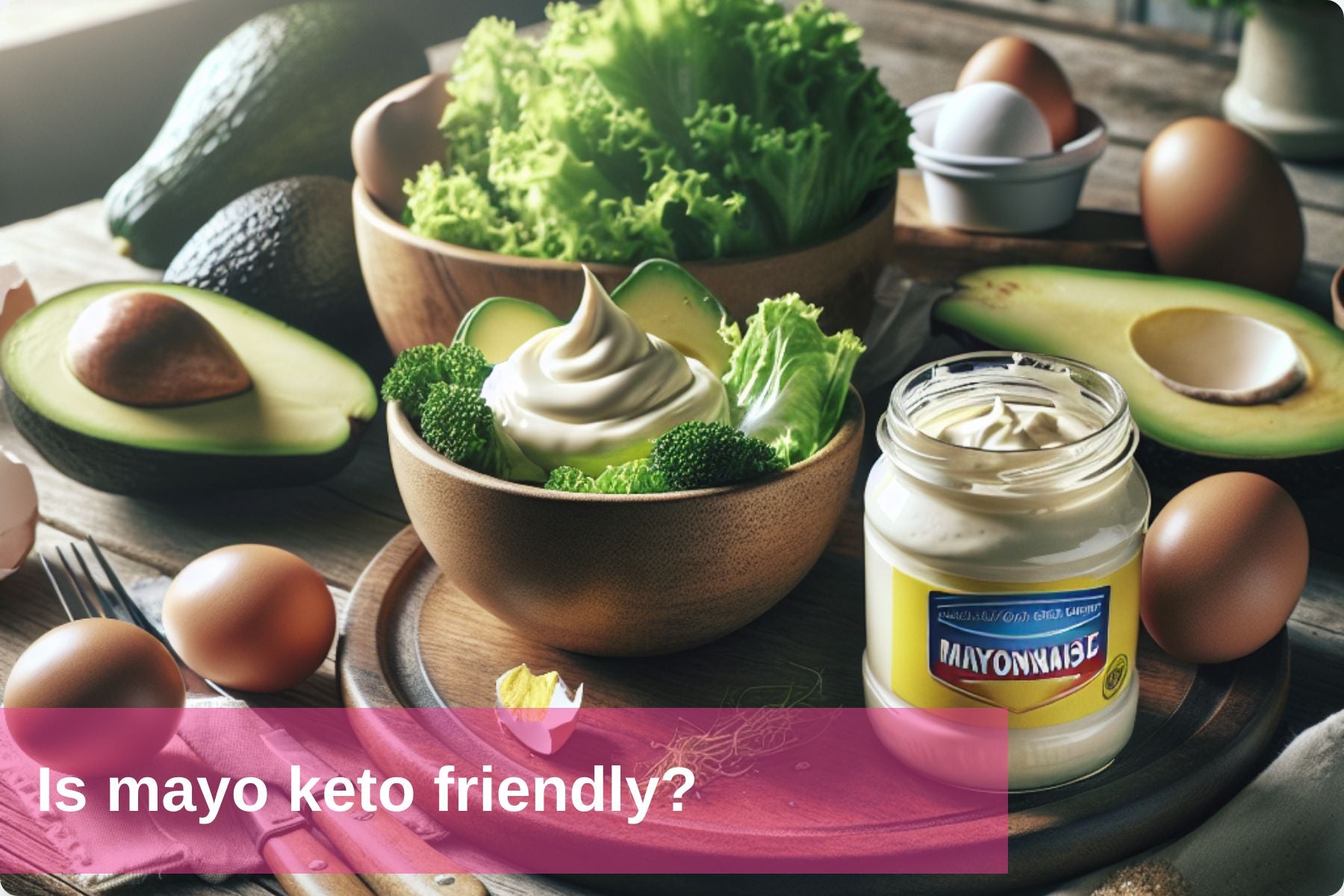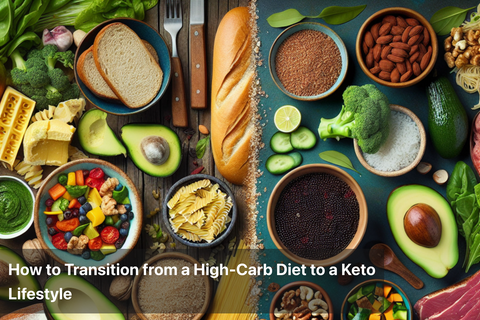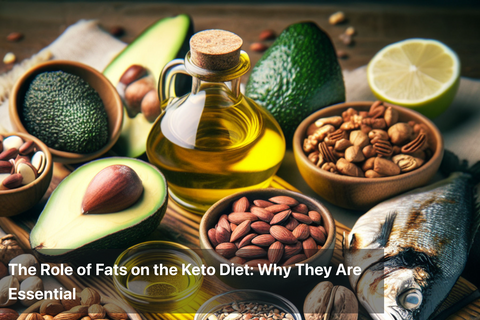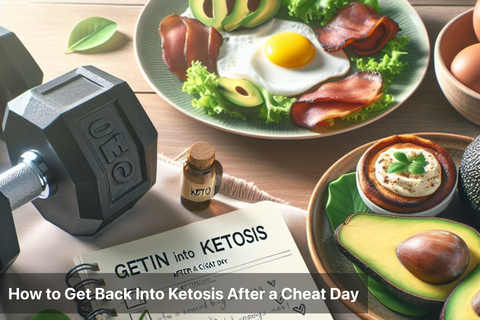
Is mayo keto friendly?
Mayonnaise - the timeless texture enhancing condiment that brings rich taste to sandwiches, salads, and more. However, those pursuing a ketogenic diet often wonder: does mayonnaise have a place in a keto framework? This creamy emulsion is more than just an indulgent topping, as it can play a strategic role for low-carb, high-fat keto lifestyles.
When considering if a food product aligns with keto principles, examining its nutritional composition is key. We must determine where mayonnaise lies on the balancing scale of carb limitation and fat maximization fundamental to the efficacy of a ketogenic diet. As it turns out, mayonnaise hits the mark on both fronts.

Mayo Nutrition Breakdown
Nutrition facts for 1 cup (220g) of Mayonnaise:
Calories |
1496 |
Total Fat |
165g |
Saturated Fat |
26g |
Trans Fat |
0.4g |
Polyunsaturated Fat |
98g |
Monounsaturated Fat |
37g |
Cholesterol |
92mg |
Sodium |
1397mg |
Total Carbohydrates |
1.3g |
Dietary Fiber |
0g |
Sugars |
1.3g |
Protein |
2.1g |
Is Mayo Keto-Friendly?
Yes, mayo (mayonnaise) is generally considered keto-friendly because of following reasons:
Low in Carbohydrates: Most mayonnaise brands contain little to no carbohydrates, making them suitable for a keto diet.
High in Healthy Fats: Mayo is primarily made from oils such as avocado, olive, or canola oil, which provide a good source of healthy fats necessary for a keto diet.
Minimal Protein: Mayo has a very low protein content, aligning with the high-fat, moderate-protein macronutrient profile of a keto diet.
Versatile Ingredient: Mayo can be used in various keto recipes, such as salads, dressings, dips, and as a spread, enhancing flavor without adding carbs.
Keto-Friendly Brands Available: There are many keto-specific mayo brands available that use high-quality oils and avoid added sugars or other non-keto ingredients.
Homemade Options: You can easily make your own keto-friendly mayo at home using keto-approved ingredients like eggs, mustard, vinegar, and healthy oils.
Avoid Sugary Varieties: Be sure to check labels for added sugars or non-keto-friendly additives, as some commercial brands may include these.
Ways to incorporate Mayo in your diet
Salad Dressings: Use mayo as a base for creamy salad dressings like ranch, Caesar, or coleslaw dressing.
Sandwiches and Wraps: Spread mayo on low-carb bread or wraps to add flavor and moisture.
Dips: Mix mayo with herbs, spices, and other ingredients to create delicious dips for vegetables, chicken wings, or keto-friendly crackers.
Deviled Eggs: Combine mayo with mustard and seasonings to make the filling for deviled eggs.
Tuna or Chicken Salad: Mix mayo with canned tuna or shredded chicken, along with celery, onions, and spices for a tasty salad.
Burger Topping: Use mayo as a topping for burgers to add creaminess and enhance flavor.
Egg Salad: Blend mayo with chopped hard-boiled eggs, mustard, and seasonings for a quick and easy egg salad.
Roasted Vegetables: Toss vegetables like broccoli or cauliflower in mayo before roasting to give them a crispy, flavorful coating.
Sauces: Create creamy sauces by mixing mayo with hot sauce, garlic, or herbs to serve with meats, seafood, or vegetables.
Coleslaw: Use mayo as the base for coleslaw dressing, adding vinegar, sweetener, and spices to taste.

Eating mayo the right way
Mayo proves to be a versatile player in the keto playbook. Its high-fat content aligns harmoniously with the macronutrient ratios advocated by the ketogenic diet. However, the devil lies in the details, especially when it comes to commercial options.
When selecting mayo for your keto journey, prioritize those made with keto-friendly oils or, better yet, whip up a batch of homemade goodness. This not only ensures you stay true to the low-carb, high-fat ethos but also empowers you to sidestep hidden sugars and additives that may lurk in store-bought varieties.
Remember, moderation is the linchpin of keto success. Portion control ensures you enjoy the creamy richness of mayo without unintentionally derailing your daily caloric and macronutrient goals.
FAQs
1. Is mayo keto friendly?
Yes, mayo is keto-friendly as it is high in fats and low in carbohydrates.
2. Can I consume mayonnaise while on a keto diet?
Yes, you can include moderate amounts of mayonnaise in your keto diet as long as it fits within your daily macronutrient goals.
3. Are all mayonnaises keto-friendly?
Not all mayonnaises are created equal. Be sure to check the nutrition label to ensure the mayo you're using is low in carbs and made with keto-friendly ingredients.
4. How can I incorporate mayo into my keto meals?
Mayonnaise can be used as a condiment, dip, or as an ingredient in keto-friendly recipes such as salads, dressings, and sauces.
5. Are there any keto-friendly mayo alternatives?
You can opt for homemade mayo using high-quality oils like avocado oil or olive oil to ensure that it remains keto-friendly.
This Blog post is an initiative by Lo! Foods, to provide accurate and Nutritionist / Doctor approved information related to Health. Lo! Foods is India's leading brand for Everyday Functional Foods. Foods designed for specific Health conditions or Needs. Lo! Foods also runs India's largest range of Low Carb Healthy Cloud Kitchens, under the brand names of Lo!, ProteinChef, ATH (All Things Healthy) and DiabeSmart.













Leave a comment
Your email address will not be published.